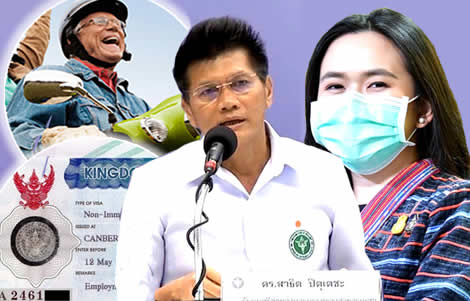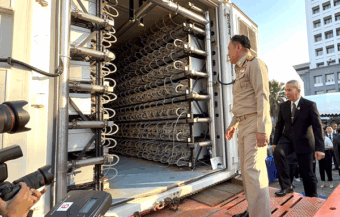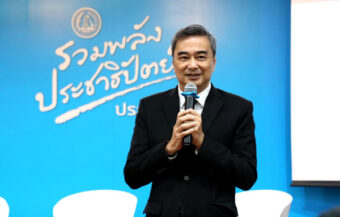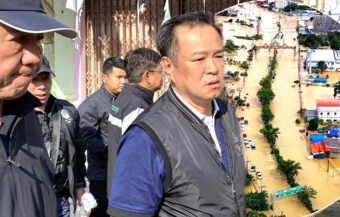Statement by Thailand’s Deputy Minister of Public Health caused some alarm among foreign visa holders and retirees in the kingdom but the change, on balance, offers more options for those holding retirement visas since the requirement for health insurance was first introduced in 2019. The question of adequate medical health insurance for long term foreigners is a key one for the government to address going forward as it copes with rising demand on the health service from Thailand’s ageing population and also to support the government’s target of attracting up to one million foreigners to come to live and work in Thailand over the next few years.
New requirements for insurance with Non-Immigrant (O-A) visa applications were announced this week as part of a range of measures decided by the cabinet in June. This will mean that foreigners retiring to Thailand and living in the kingdom can now use offshore insurance cover but must show $100,000 in coverage that matches the requirement of medical health service providers.

Thailand’s Deputy Minister of Public Health, Satit Pitutacha, on Tuesday, announced that those applying for Non-Immigrant (O-A) visas for up to one year must show that they have adequate insurance cover in line with a requirement first introduced in 2019 at a new cover level of $100,000 or ฿3.34 million.
The statement drew some social media reaction with many foreign visa holders and retirees in the kingdom expressing their alarm.
The key thing to note is that this requirement does not impact most retirees in Thailand who, for the most part, hold Non-Immigrant O visas as opposed to Non-Immigrant O-A visas.
Terms and conditions differ between a Non-Immigrant O visa and a Non-Immigrant O-A visa
There are differences between Non-Immigrant O-A visas and Non-Immigrant O visas in that the latter is a wider-ranging visa type with somewhat easier financial requirements.
This visa is initially granted as a single entry visa and is valid for 90 days from Thai embassies and consulates worldwide.
It also requires insurers to cover ฿400,000 for inpatient costs, as part of the measure introduced in 2019 and can be extended once in Thailand for up to a one year period.
The Non-Immigrant O-A visa has more demanding financial requirements but is a multiple entry visa issued for twelve months.
According to the Immigration Bureau and the Ministry of Foreign Affairs, only 3,768 of these visas were issued between this year and last.
However, the updated requirements and the move in 2019 to require medical insurance for these types of visa, does signal the government’s intent for the future.
In the last two years, there has been a significant increase in retirees in Thailand purchasing medical health insurance to renew or extend retirement visas.
Changes made by the cabinet in June following problems encountered by many elderly foreigners
In June this year, the cabinet made changes to the regulations to allow foreigners living in Thailand to purchase insurance policies outside Thailand to meet this requirement.
It had emerged that a significant number of elderly people had been forced to leave the country after living here for many years when they could not obtain the appropriate insurance cover from Thai insurers to comply with Immigration Bureau regulations.
There were also cases that arose due to the pandemic when many long term residents could not return to the country to renew their retirement visas.
Change in insurance rules for retirement visas after some over 70s were forced out of Thailand
The 2019 regulation requiring health insurance for both Non-Immigrant O-A and Non-Immigrant O retirement visas had specified that the insurance cover must be taken out through firms in Thailand.
Insurance cover must be verifiable and is subject to approval by the Immigration Bureau officer
This has now been changed but the immigration officer handling applications must be satisfied that the insurance cover proposed is genuine and matches the minimum standards required by Thai medical health facilities.
Each policy must demonstrate adequate health cover is maintained so that medical health services can be provided by hospitals to all retired foreigners living in Thailand as required.
The requirement, introduced in 2019, in respect of retirement visas for those seeking a Non-Immigrant O-A visa or a Non-Immigrant O for living and working in Thailand, at that point, only required ฿400,000 in insurance cover.
Only retirement visas are required to show any level of insurance cover for now but change is coming
The increased coverage requirement does not apply to Non-Immigrant O retirement visas for now but this could change.
Marriage visas, non-immigrant B visas or other visa types do not yet have medical health insurance requirements although this may also change in the future as Thailand looks at the question of health coverage for foreigners living and working in the kingdom.
The question of the cost of healthcare for foreigners living in Thailand has become increasingly pertinent with ongoing stories of expats or visitors suffering strokes or debilitating attacks and then being found in a position not to be able to afford the appropriate hospital care.
Issue of healthcare for long term resident foreigners is a growing one as is health care for elderly Thais
Under Thai public health ethical guidelines, hospitals are required to treat all those admitted in emergency cases but the country’s public health system is still primarily a commercial one spanning private hospitals with public health facilities.
At the same time, Thailand does provide universal coverage to its citizens through a combination of the civil service pension system, a social security system for tax-paying employees and a public system introduced in the Thaksin era where a small charge is levied on less well off Thai nationals.
Thailand’s ฿30 health care initiative, introduced in 2002, is a success and very popular with the public
The latter, a radical departure for a low-income country, is a means-tested system where the less well off pay ฿30 as part of a co-payment system where ‘gold card’ holders are given local treatment in a system overwhelmingly funded by the public purse but with a personal contribution that works extremely well and is very popular with Thai people who use it.
Dutchman’s case dismissed by the Administrative Court after he challenged 2019 tiered pricing order
A the end of September, a 52-year old Dutch man suffering from cancer, Erwin Buse, living in Prachuap Khiri Khan, had a case rejected by the Administrative Court in his area which challenged a 2019 government order which included tiered pricing for medical services and treatment which left foreigners living in Thailand with marriage and retirement visas paying substantially more than Thai nationals or even foreigners with non- Immigrant B visas.
They essentially had the same status as tourists.
The court justified its decision to dismiss Mr Buse’s case based on the national interest and assumed that foreigners living in Thailand had the means to pay for private health insurance or medical treatment.
Erwin Buse, who is married to his Thai wife for twenty years and has lived in Thailand since 2005, currently has the option of a marriage visa but if the medical insurance requirement is extended to this visa type or others, it would pose a major problem for him and to tens of thousands of other retired foreigners in Thailand, many of whom also have underlying conditions such as Type 2 diabetes.
Rapidly ageing society where there will be fewer workers to meet the increasing demand for health care resources is a key concern for the government
It comes as Thailand is itself coming to terms with a rapidly ageing society and a growing need by the government to fund what will be rising care costs for the elderly with a declining workforce and an economy which, since 2019, has been sputtering
Cases like that of Mr Buse and the ongoing tragedies of long term resident foreigners suffering strokes, heart attacks or misadventures in Thailand, have begun to focus the attention of the authorities on the situation as the expat and foreign community in the country is set to grow as the government is now deliberately targeting such immigration into the kingdom to boost the economy and foreign investment.
Government programme to attract 1 million wealthy foreign residents to live and work in Thailand
The Thai government is currently rolling out its various schemes to attract up to 1 million foreigners to live and work in the kingdom while generating up to ฿1 trillion in additional GDP and expanding the tax base.
New money for residency scheme may go live in January 2022 says government spokeswoman
A non-immigrant (O-A) visa is issued to foreigners aged 50 years and over who wish to live in Thailand for one year but who are not working in the kingdom.
Without insurance, retired foreigners must show proof that they can pay for emergency healthcare
In June, government spokeswoman, Trisulee Traisanakul, while explaining the cabinet’s decision on the issue, also made it clear that where a foreigner cannot obtain the appropriate insurance cover as required by the new regulation, the immigration officer would require both a letter showing a rejection of his or her application and then would need to see adequate evidence that the visa applicant had the financial resources to pay for any emergency or medical treatment requirements while living in Thailand.
Join the Thai News forum, follow Thai Examiner on Facebook here
Receive all our stories as they come out on Telegram here
Follow Thai Examiner here
Further reading:
New plan for the Thai economy could see an elite foreign visa scheme generate up to 6% of GDP
New money for residency scheme may go live in January 2022 says government spokeswoman
Change in insurance rules for retirement visas after some over 70s were forced out of Thailand
Economic plan to put the smile back in Thailand’s appeal to western foreigners to live and work
Deputy Public Health Minister leaves expats confused with ‘over 50s’ visa insurance press comments
Thai Ministry of Health brings in tiered pricing for medical services to foreigners and tourists
50-year-old Dutchman suffering from cancer files complaint against Hua Hin hospital over fees
Battlefield friends help UK man and wife escape medical bill of £12k in Thailand. Now safely home
New health coverage proposals for foreigners in Thailand a concern for those with medical conditions
UK man stranded in Thailand facing a £100,000 medical bill may be rescued by crowd funding success
Thai government’s new compulsory insurance may only apply to retirement visas for foreigners
World Bank downgrades growth prospects as Thai economic recovery in 2021 looks still uncertain
Plan to allow high tech and skilled foreigners to live and work in Thailand for up to four years
Thailand must bite the bullet and reopen to foreign tourists from October 1st to save industry
Minister urged not to be afraid to borrow in 2021 as fears grow for a quick foreign tourism revival
Economy to rebound as the year progresses driven by exports and a return of mass foreign tourism
Door closing on quick foreign tourism return as economic recovery is delayed to the end of 2022
Fact – only 6,556 visitors arrived in Thailand last month compared to 3.95 million in December 2019
Desperate foreign tourism business concerns are clinging to straws as they try to survive the crisis
Finance Minister says economy must pivot away from tourism with a switch to S-Curve industries
Visa amnesty finally ending but the new regime is pragmatic and may allow for further renewals
Visa amnesty to be retrospectively extended to October 31st says top Immigration Bureau officer


















